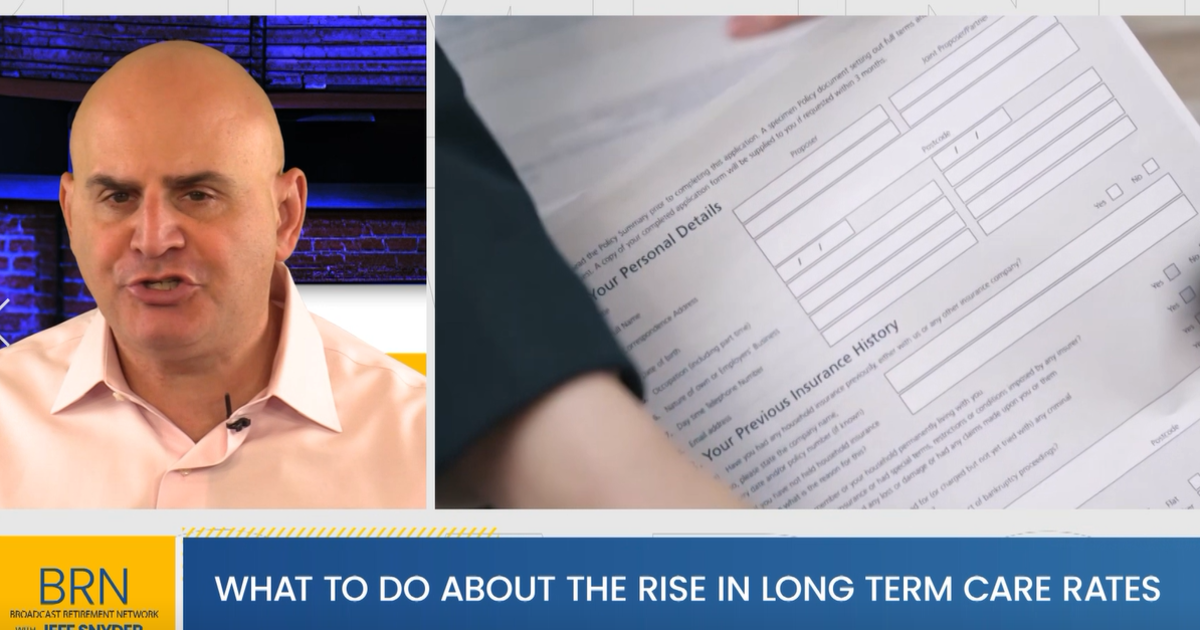Copyright The Street

In Some Cases, Premiums Are Being Increased 550% Broadcast Retirement Network’s Jeffrey Snyder discusses rising long term care insurance premiums with The Warner Companies’ Philip Snyder, CLU. Jeffrey H. Snyder, Broadcast Retirement Network This morning, what to do about the rise in long term care insurance rates. Joining me now to help break it all down is Philip Snyder of the Warner Companies. And for full disclosure, he is my father. Dad, great to see you. Thanks for joining us this morning. Hey, Jeff. Good morning. Nice to be with you. Yeah, it’s always great to catch up. Glad we could see each other last time I was in good old Baltimore. But dad, I wanted to come to you because I think this is a big issue. We’ve talked with you about purchasing long term care insurance. We got a lot of feedback after a recent show with CareScout about the costs really inflating policy makers, policy owners, like big insurance companies are now coming and asking for longtime policyholders to make higher premiums. Phillip Snyder, CLU, The Warner Companies That’s a big deal. Right. It’s a very big deal. It’s not a good situation. I won’t name names, but some of the originator, originating companies in this marketplace 25, 30 years ago, dove in and I will say with expectations that haven’t been realized. Pricing was in reality too low. They didn’t properly anticipate the cost of claims, potential claims. And they certainly felt that lapse rates, policy lapse rates would be far greater than what they in actuality have become. And all this has led to pressure on these companies who underpriced their product. And so now they’re coming back to their policy owners, in some cases, 25 years or more into the policy and asking for, well, they’ve been asking for rate increases over the years, but now the rate increases have become in many cases untenable for the buyers. And it’s a real problem. Jeffrey H. Snyder, Broadcast Retirement Network It is. And, okay, let’s talk about, so you mentioned that kind of what happened 25 years ago, new market, generally speaking, anytime there’s a new entrant, new marketplace, you kind of, in order to incentivize people to buy your product, you may offer a discount rate over a year. These rate increases, so insurance like long-term care insurance, dad, is regulated at the state level. So state insurance commissioners would have to give their blessing to these types of increases. Phillip Snyder, CLU, The Warner Companies Oh, for sure. And I’ve experienced this myself and I’m going through it now, although not to the extent that others are. Yes, insurance companies will file, for lack of a better term, a rationale and ask for a rate increase. And typically, they’ll shoot at a higher level than they’re likely to get. And they’ll submit rationale as to why figures and conceptually why they need a rate increase. And insurance commissioners will then pass judgment on that and typically grant the rate increase. But now we’re seeing rate increases that are just in some policies that are 100, 200 or more percent for people who bought these policies who are now in their latter years who may well soon need these policies. And the premiums are just untenable. They’re just too high. So I know there are some options, I think, with respect to the policies themselves. People could obviously cancel the policies, which would not be good. Yeah, what’s the point? Yeah, they may not. They may be able to take some sort of a paid off, reduced benefit type of policy or things like that. But the options are not ideal for older people now who are living many on fixed incomes or certainly reduced incomes and really can’t afford to pay these premiums. Jeffrey H. Snyder, Broadcast Retirement Network So I want to talk about solutions in a minute, but I want to get back to, if I can, just to kind of let’s talk about some of the factors that go into the pricing here, one of which that has increased probably in the last 20, 25 years since the products have been created was longevity. People are just fundamentally living longer. And as we know from this government shutdown debate, cost of health care is going through the roof. I mean, it’s just it’s there’s a lot of so and the cost of, you know, long term care being in a facility, continence assistance, caregiving assistance, those things are going up in cost. So there’s a confluence of of factors that are that are playing in here. Phillip Snyder, CLU, The Warner Companies Absolutely. No question about it. And again, these I think the products that are currently being marketed and by the way, there’s very few companies selling free what I call freestanding long term care policies, but they’re they’re more properly priced today than they certainly were when the products were introduced years ago. And so people are it’s it’s a real conundrum. It’s a problem for these older people as to what they’re going to do. The reality is that marketplace is very small now. There’s a huge need for long term care, which is nowhere near being realized in the marketplace. But the the pricing is more favorable today. I mean, my own policy that I bought 25 years ago has increased 100 percent. It’s still cost effective for me because I started out at a very low premium. But by and large, it’s you know, most people, anybody who bought a long term care policy probably has received long term increases in their long term care premiums. Jeffrey H. Snyder, Broadcast Retirement Network Okay, so now what do you I mean, that’s that’s a lot. And again, just to reiterate, when you’re on a fixed income as a retiree, someone who’s 65 or older, you’ve got another 25 years of life, hopefully more left, maybe conceivably more with all these developments on the wellness front. What what do you do? Because you mentioned giving up the policy that that seems defeatism. That’s defeated. That’s being defeated. So what do you do? Phillip Snyder, CLU, The Warner Companies Well, you could be in my own case, you with my carrier, you were given options to reduce the benefits. You can lower the amount of daily benefit or monthly benefit. You can change the duration. If you had a cost of living benefit, you could modify that potentially. Not not not a broad spectrum of alternatives, but these carriers are at least giving some alternatives for you to mitigate the cost increase. None of them are ideal. But because you’re reducing the amount of money in your benefit pool, that could ultimately be available to defray expenses. So but at least those are potential alternatives. But older people who may have health issues now can’t go to the marketplace and buy a replacement policy. Can’t do it. They can’t qualify for it, medically or otherwise. So it’s it’s a problem. Jeffrey H. Snyder, Broadcast Retirement Network Yeah. And you actually, you know, I’m thinking about it, you’re actually being penalized for doing the right thing. 25 years ago, you looked at the market. I mean, this is something that doesn’t feel right to me. I understand the insurance companies have the liability on their books. I get it. They got to pay. But they also knew kind of what they were getting into. They and look, the contract that does allow a insurance company to adjust their rates. I mean, they do this with all types of products, not just long term care. Phillip Snyder, CLU, The Warner Companies Right. And well, they do, because experience, for example, in types of life insurance policies, permanent life insurance experience of the carrier in a variety of features within the policy dictate the pricing, long term pricing. But these policies were sold as non-cancellable guaranteed renewable contracts. Yeah. And the guaranteed renewable gave the carriers the opportunity to adjust premiums in the future. Now, they can’t individually select who they’re going to increase and not increase. They have to be done on a policy class basis applicable to any given jurisdiction. When that whole was sorry, Jeff. So so consequently, it’s I keep saying this. It’s a big problem. And I don’t know how it’s going to get solved. Yeah, I don’t think a lot of the potential for rate increases was really conveyed at time of sale in many of these cases. And therefore, these are big surprises, a bit surprises. Now, these policies generally didn’t stay static pricing for 20 years and then go up. I’m sure they’ve inched their way up over time. Yeah, right. But now they’re radical. Some of these increases. Jeffrey H. Snyder, Broadcast Retirement Network So let me ask you, we’re kind of running out of time. We’ll probably have to do another episode of this, but I’ve got like two minutes left. So let me just let me just ask you some pointed questions, if I may. Is there a role here? You know, we’ve talked with you about Washington state and their what they’re doing. I’m a little leery about the government getting into the long term care business. I don’t think, you know, government, you know, they’ve had some challenges in other areas related to wellness. And I’m not sure about that. But is there a role here for the feds or for the local state governments? Phillip Snyder, CLU, The Warner Companies That’s really an interesting question. I mean, Washington’s put a plan in place, the state of Washington, not the District of Columbia. It provides some benefits. I think it’s capped at maybe $36,000, $38,000 total available benefit. That’s not a lot of benefit. But and I know that, excuse me, other states are working on this, California, New York, Minnesota, probably Connecticut. But the cost would be enormous. Most states’ budgets are under a lot of pressure to begin with. And certainly, I don’t see it as a federal issue in terms of bailing out these insurance companies. I don’t know what the fix is. Jeffrey H. Snyder, Broadcast Retirement Network So my second question, I guess, you know, we’d have to like policymakers. I mean, my opinion is my opinion. It doesn’t represent the network, of course. But if you’re a younger person, so let’s talk about people in their 30s or 40s. Knowing this experience that maybe your parents are going through and the older, I’m going to call them boomers. Dad, you’re a boomer. The baby boomers are going through. Do you actually buy this product? Do you think about buying the product or maybe you think of an alternative way? Maybe you buy a whole life policy that builds cash value and you try to leverage your just general savings. Phillip Snyder, CLU, The Warner Companies There’s a whole generation of newer products. They’re really hybrid type products that maybe could be better choices for people. They could be life insurance policies with a rider, for lack of a better term, that allows you to access the death benefit for long term care expenses, kind of pull forward the death benefit. There are policies and this type of policy is fully guaranteed so that you won’t have these variables increasing costs in the future. There are no variables. You could buy a small life insurance policy with a robust long term care benefit. You can control that to some degree, the benefit, the premium pay in period. Most of these policies give you the opportunity to consolidate payments if you want to, as opposed to paying over your lifetime. They include all kinds of features, COLAs, cost of living adjustments and things of that nature that are favorable I think that’s where the market is at the moment. There’s still a couple of companies selling long term care products. There’s one that I know of that will let you limit, that will offer a guaranteed limited premium pay in period if that’s what you want to do. But by and large, in the absence of that limited pay in period, you’re still potentially subject to rate increases in the future. So it’s a problem. I think we’re looking to other ways to solve that problem if we’re going to use insurance products. Some of them were mentioned. Jeffrey H. Snyder, Broadcast Retirement Network I mean, you just got to be aware of that. I got to wrap it. But I would just say I agree with you. There’s got to be solutions out there. It’s a problem because we’re all going to live, knock on wood, you know, God forbid, we’re going to live a long time. We’re going to need help and support. And there’s a whole bunch of us. There’s a lot of people in your generation, my generation, but Gen Y, the millennials, that’s like the biggest generation of all. So this is a big problem. Dad, we’re going to leave it there. Always great to see you. Thanks for your advice, insight, and analysis. And we look forward to having you back on the program again very soon. Phillip Snyder, CLU, The Warner Companies Anytime you want, Jeff. Hope it helps. Jeffrey H. Snyder, Broadcast Retirement Network Bye-bye. Thanks, Dad. Great to see you. Thanks for sharing your perspective. That wraps up this episode, but guess what? We’re back again tomorrow. Until then, I’m Jeff Snyder. Stay safe, keep on saving, and don’t forget, roll with the changes.



